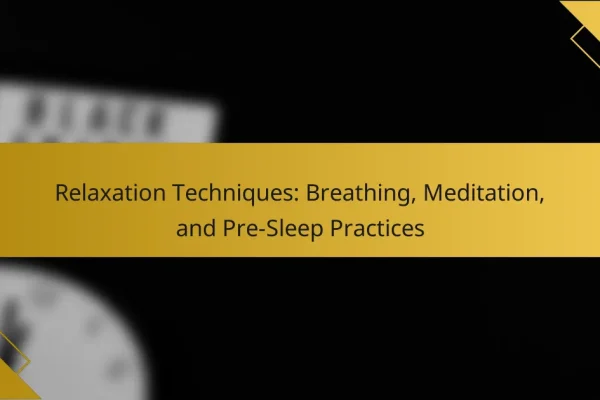How does sleep hygiene impact stress relief?
Sleep hygiene significantly affects stress relief by promoting better sleep patterns and enhancing overall well-being. Good sleep hygiene practices help individuals achieve restorative sleep, which is crucial for managing stress effectively.
Improved sleep quality
Improved sleep quality is a direct benefit of maintaining good sleep hygiene. Establishing a consistent sleep schedule, creating a comfortable sleep environment, and minimizing distractions can lead to deeper, more restorative sleep. Aim for 7 to 9 hours of sleep each night to maximize these benefits.
Consider implementing a bedtime routine that includes winding down activities, such as reading or meditating, to signal your body that it is time to sleep. Avoid screens and bright lights at least an hour before bed to enhance melatonin production.
Reduced anxiety levels
Good sleep hygiene can lead to reduced anxiety levels by allowing the brain to process emotions and stressors more effectively during sleep. When you sleep well, your body can better regulate stress hormones, which helps in managing anxiety.
To reduce anxiety, practice relaxation techniques before bed, such as deep breathing or gentle yoga. Limiting caffeine and alcohol intake, especially in the hours leading up to sleep, can also contribute to lower anxiety levels.
Enhanced mood stability
Enhanced mood stability is another important outcome of effective sleep hygiene. Quality sleep helps balance neurotransmitters that regulate mood, leading to fewer mood swings and a more positive outlook. Consistent sleep patterns can help stabilize emotional responses to daily stressors.
To maintain mood stability, prioritize sleep by setting a regular bedtime and wake-up time, even on weekends. Engage in regular physical activity during the day, as this can improve sleep quality and overall mood.
What are effective sleep hygiene practices for stress relief?
Effective sleep hygiene practices can significantly reduce stress and improve overall well-being. By incorporating consistent routines and creating a conducive environment for sleep, individuals can enhance their sleep quality and, in turn, alleviate stress levels.
Consistent sleep schedule
Maintaining a consistent sleep schedule helps regulate your body’s internal clock, making it easier to fall asleep and wake up. Aim to go to bed and wake up at the same time every day, even on weekends, to reinforce this rhythm.
Consider setting a bedtime alarm to remind you when to start winding down. This can help you avoid late-night distractions and ensure you get the recommended 7-9 hours of sleep each night.
Comfortable sleep environment
Your sleep environment plays a crucial role in achieving restful sleep. Ensure your bedroom is dark, quiet, and cool, as these conditions are conducive to better sleep quality.
Invest in a comfortable mattress and pillows that support your sleeping position. Additionally, consider using blackout curtains or a white noise machine to minimize disturbances from outside noise and light.
Limiting screen time before bed
Reducing screen time before bed is vital for improving sleep hygiene. The blue light emitted by phones, tablets, and computers can interfere with melatonin production, making it harder to fall asleep.
Aim to turn off electronic devices at least 30-60 minutes before bedtime. Instead, engage in relaxing activities such as reading a book or practicing gentle stretches to prepare your mind and body for sleep.
Relaxation techniques
Incorporating relaxation techniques into your nightly routine can help ease stress and promote better sleep. Practices such as deep breathing, meditation, or progressive muscle relaxation can calm your mind and body.
Consider dedicating 10-15 minutes before bed to these techniques. Apps or guided sessions can provide structure and help you stay consistent in your practice, making it easier to unwind after a long day.
Which products can enhance sleep hygiene?
Several products can significantly improve sleep hygiene by creating a more conducive sleep environment. These include memory foam mattresses, white noise machines, sleep masks, and aromatherapy diffusers, each serving a unique purpose in promoting better sleep quality.
Memory foam mattresses
Memory foam mattresses provide support by contouring to the body’s shape, which can alleviate pressure points and enhance comfort. They are particularly beneficial for individuals with back pain or those who sleep on their sides. When selecting a memory foam mattress, consider factors like density and firmness to match your sleeping style.
Look for mattresses that have certifications, such as CertiPUR-US, which ensures they are made without harmful chemicals. A good quality memory foam mattress can last several years, making it a worthwhile investment for better sleep hygiene.
White noise machines
White noise machines create a consistent sound environment that can mask disruptive noises, helping to improve sleep quality. They are especially useful in urban settings or for light sleepers who are easily awakened by sudden sounds. Many models allow you to adjust volume and sound types, from traditional white noise to nature sounds.
When choosing a white noise machine, consider portability if you travel frequently. Some devices also offer features like timers and Bluetooth connectivity, allowing for a more personalized sleep experience.
Sleep masks
Sleep masks block out light, which can help signal to your body that it’s time to sleep. They are particularly effective for those who sleep during the day or in brightly lit environments. Look for masks made from soft, breathable materials to ensure comfort throughout the night.
Consider options with adjustable straps for a better fit, and explore masks that include features like cooling gel or aromatherapy pockets for added relaxation. A good sleep mask can significantly enhance your ability to fall asleep and stay asleep.
Aromatherapy diffusers
Aromatherapy diffusers disperse essential oils into the air, creating a calming atmosphere that can promote relaxation and improve sleep quality. Popular oils for sleep include lavender, chamomile, and sandalwood. Using a diffuser before bedtime can help signal to your body that it’s time to wind down.
When selecting a diffuser, consider the size of the room and the duration of the mist. Some diffusers come with timers and light features, which can enhance the overall sleep environment. Ensure you use high-quality essential oils to maximize the benefits of aromatherapy for sleep hygiene.
What are the prerequisites for effective sleep hygiene?
Effective sleep hygiene requires a combination of consistent sleep schedules, a conducive sleep environment, and awareness of personal habits that affect sleep quality. Establishing these prerequisites can significantly enhance the ability to fall asleep and stay asleep, ultimately reducing stress levels.
Understanding personal sleep patterns
Recognizing your unique sleep patterns is crucial for effective sleep hygiene. This involves tracking when you feel most alert and when you tend to feel sleepy, which can vary from person to person. Keeping a sleep diary can help identify these patterns and inform adjustments to your routine.
Consider factors such as sleep duration, quality, and timing. Aim for 7-9 hours of sleep per night, and try to maintain a consistent bedtime and wake-up time, even on weekends. This regularity helps regulate your body’s internal clock, improving overall sleep quality.
Identifying stress triggers
Understanding what causes stress in your life is essential for improving sleep hygiene. Common stress triggers can include work pressures, personal relationships, or financial concerns. Identifying these triggers allows you to address them proactively, reducing their impact on your sleep.
Once identified, consider strategies to manage these stressors, such as practicing mindfulness, engaging in regular physical activity, or seeking professional support. Creating a relaxing bedtime routine that includes activities like reading or meditation can also help mitigate stress before sleep.
How can sleep hygiene be tailored for urban environments?
Sleep hygiene in urban environments can be adapted by addressing common challenges such as noise, light pollution, and limited space. Implementing specific strategies can significantly enhance sleep quality and overall well-being.
Noise reduction strategies
Urban living often involves exposure to various noise sources, which can disrupt sleep. To mitigate this, consider using soundproofing techniques such as heavy curtains, acoustic panels, or weather stripping on windows and doors.
Additionally, white noise machines or apps can help mask disruptive sounds. Aiming for a consistent sound level can create a more conducive sleeping environment, making it easier to fall and stay asleep.
When selecting noise reduction methods, assess your specific situation. For example, if street noise is a concern, investing in double-glazed windows may be worthwhile, while earplugs can be a cost-effective solution for occasional disturbances.












